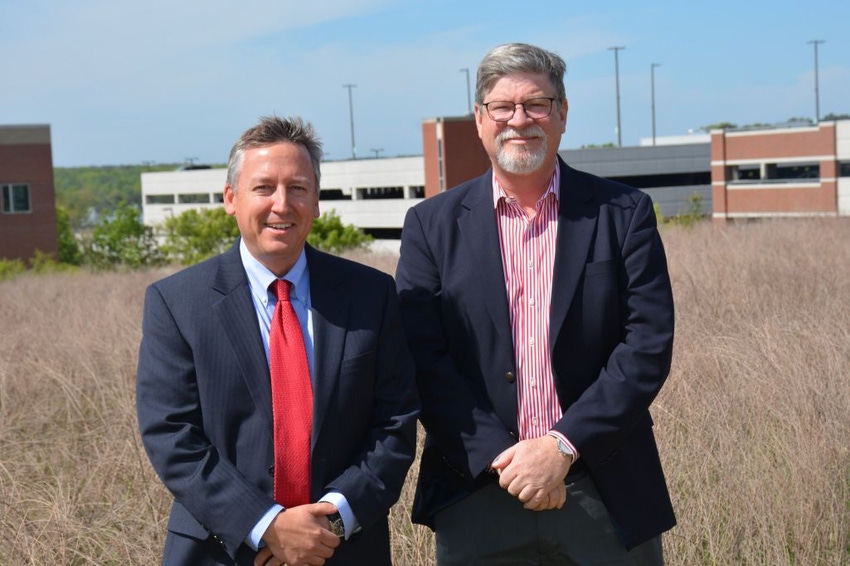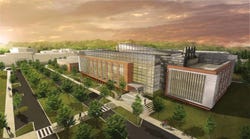
If all goes as planned, a new 200,000 square foot plant sciences research complex will be up and running on the North Carolina State University Centennial Campus by 2020.
The North Carolina plant sciences initiative received a big boost on March 15 when North Carolina voters approved a $2 billion bond package that includes $85 million for the building. Funding for the rest of the $160.2 million complex is coming from a fund raising campaign.
Richard Linton, dean of the College of Agriculture and Life Sciences at N.C. State, says $99 million has already been raised, which includes the $85 million bond package and $14 million raised by the university. Linton credits the support of the North Carolina Farm Bureau and many of the state’s commodity groups for contributing to the fund raising effort. The university is now reaching out to private donors and agribusiness to raise the rest of the money.
“For the rest of the $61.2 million, it is our hope that we can raise those dollars within the next year or two at the most. Once we raise the funds that we need, the building project in total will probably take four to five years to complete,” Linton said.
“In a perfect world, if everything were to line up, you’re looking at a 2020 opening. If things don’t line up perfectly, you’re probably looking at an opening in the 2020 to 2022 time frame,” Linton explained.
Once funding has been secured, a year to two years is needed for planning, such as developing architectural drawings and site preparations. Construction is a two year to three year process, and Linton is hopeful the 2020 opening will be reached.
A two-pronged effort

An artist's concept drawing shows how the Plant Sciences Research Complex on North Carolina State University’s Centennial Campus could appear.
Linton says the time leading up to construction of the plant science research complex will be put to good use. Steven Lommel, associate dean and director of the North Carolina Agricultural Research Service at N.C. State, is spearheading efforts to get the initiative up and running. Lommel is working on the programmatic needs of the initiative to have scientists to fill the building from day one.
“The plant sciences initiative is a two-pronged effort,” Lommel explained. “First, the building and second, how do we do interdisciplinary science to bring all of the assets together to look at some of the grand challenges and opportunities in the plant sciences.”
Four task forces are now working on plans for the initiative. One task force is focused on advocacy, while a second task force is focused on a governance structure of the initiative. A third task force will focus on the science and plans to seek a director for the center while the fourth task force is examining how we can best integrate our research effort with outreach to our stakeholders and and student education.
Lommel said the initiative should be operational within a year with scientists working virtually until the building is complete. “Many teams will be already aggregated and funding will be ready to go when the building is completed. The programs will already be operating when the building is ready. That’s our goal,” Lommel said.
The initiative is unique because it is interdisciplinary, bringing numerous disciplines together. Linton said the goal is to make North Carolina the global leader in plant sciences.
In the research complex, university officials will bring scientists from various disciplines – including crop and horticultural science, soil science, plant pathology, entomology, plant and microbial biology and biochemistry – together with engineers, mathematicians, physicists and economists from the university, government and industry.
Linton said strategic planning for the initiative began four years ago and the need for increased emphasis on the plant sciences came through loud and clear. Both internal and external stakeholders agreed that N.C. State was the ideal institution to lead the effort.
“We have a strong foundation in place with our faculty and our staff,” Linton explained. “About 60 percent of our faculty has some kind of a plant science focus to what they do. North Carolina is unique in that we have almost every climate and soil type available. We can do research in different soil and climate types that might mimic Indiana, Pennsylvania, Georgia and California, all within a small confined state, and we have 18 different research stations and a partnership with the North Carolina Department of Agriculture that would support that kind of diversity.”
Noting that 85 percent of future jobs in agriculture nationwide and globally will involve plant sciences, Linton said, “It’s our responsibility to help prepare for that future. That’s what the Plant Sciences Initiative is all about. “It’s also about ensuring that our students have access to world-class facilities that inspire innovation, collaborative and interdisciplinary problem-solving that will make them much better prepared for the job market and for leadership in the agricultural and life sciences.”
About the Author(s)
You May Also Like






